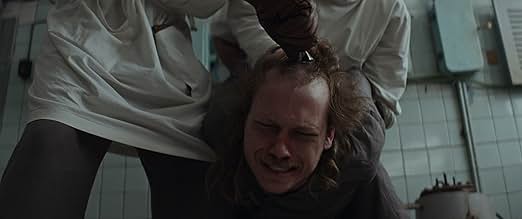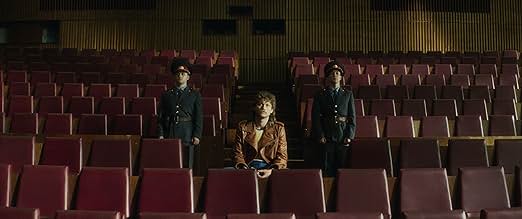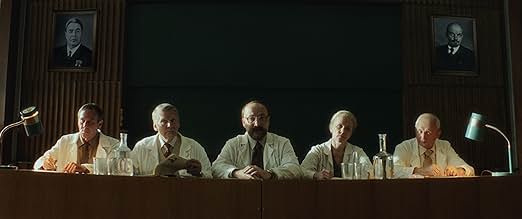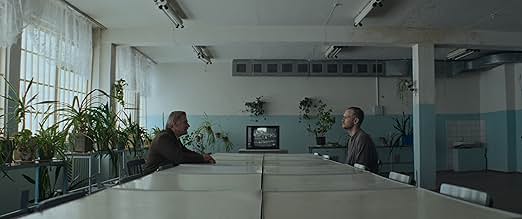Ajouter une intrigue dans votre langueAndriy Dovzhenko demonstrate disobedience to the Soviet system, but system is trying to break him with forbidden punitive psychiatry practice. Will his system break him?Andriy Dovzhenko demonstrate disobedience to the Soviet system, but system is trying to break him with forbidden punitive psychiatry practice. Will his system break him?Andriy Dovzhenko demonstrate disobedience to the Soviet system, but system is trying to break him with forbidden punitive psychiatry practice. Will his system break him?
- Réalisation
- Scénario
- Casting principal
- Récompenses
- 2 victoires et 3 nominations au total
Avis à la une
10voznuk
That's what ruzzians want to do with Ukrainians one more time. Want to show this leftist in Europe what communism means for humanity, and how many crimes against humanity they do in all post soviet countries. I not talking about massive graves, famine, deportations. General sponsor of all this crimes still sitting in moscow and this evil never sleeps. I hope so everyone in this world understand this. Ruzzians always lie. War for the sake of war, sadism for the sake of sadism, murder for the sake of murder. Thinking about it please. My recommendation "20 days in Mariupol " to better understanding.
Just watched "Mad Ones". AND I'M JUST AMAZED!
This is exactly what I was looking for! It reminded me of "Oxygen Starvation" and "Do It Once", and in some aspects, I even saw parallels with "A Clockwork Orange" regarding the themes of power abuse and the concept of punishment.
I'm writing this review right after watching it, still under the impression.
The acting and directing are truly top-notch, easily comparable to Hollywood blockbusters. The script and pacing keep you on edge from start to finish. The film begins as the tragedy of a person suffering because they see further than what society allows others to, captivating right from the start, but then takes an entirely unpredictable turn.
I want to highlight the portrayal of institutions of confinement and punitive psychiatry. There's a reason the term "to inject" (as in forcibly sedating someone) carries unique connotations in Eastern Europe. It's a national trauma, I'd say. In my previous work, I encountered thousands of law enforcement officers from across the country. I visited four correctional facilities, saw both the façades built "for inspectors" and what lay behind them. But nothing shocked me more than Oleksiyivska Penal Colony #25 - a place so lavishly renovated it looks more like a palace than a prison. However, those who know how many corpses its foundations hide, how it was built, and the brutal torture methods employed would say it out-horrors any horror movie.
The actors portraying the sadistic orderlies did so authentically that it reminded me of real people I had worked with - their mannerisms perfectly replicated. The sadistic moods and emotions were so precisely captured that I can say it was an exact match. The portrayal of women seeking career advancement at any cost, and the various types of "service workers" - their resemblance to real-life counterparts was uncanny.
Fortunately, by the time I left the law enforcement system, the agencies were undergoing deep reforms. Many good, kind-hearted, and honorable people had come in - mostly young professionals and war veterans who couldn't find a place for themselves in civilian life. But there are still those who cling to nostalgia for the "old days" and dream of their return.
This is exactly what I was looking for! It reminded me of "Oxygen Starvation" and "Do It Once", and in some aspects, I even saw parallels with "A Clockwork Orange" regarding the themes of power abuse and the concept of punishment.
I'm writing this review right after watching it, still under the impression.
The acting and directing are truly top-notch, easily comparable to Hollywood blockbusters. The script and pacing keep you on edge from start to finish. The film begins as the tragedy of a person suffering because they see further than what society allows others to, captivating right from the start, but then takes an entirely unpredictable turn.
I want to highlight the portrayal of institutions of confinement and punitive psychiatry. There's a reason the term "to inject" (as in forcibly sedating someone) carries unique connotations in Eastern Europe. It's a national trauma, I'd say. In my previous work, I encountered thousands of law enforcement officers from across the country. I visited four correctional facilities, saw both the façades built "for inspectors" and what lay behind them. But nothing shocked me more than Oleksiyivska Penal Colony #25 - a place so lavishly renovated it looks more like a palace than a prison. However, those who know how many corpses its foundations hide, how it was built, and the brutal torture methods employed would say it out-horrors any horror movie.
The actors portraying the sadistic orderlies did so authentically that it reminded me of real people I had worked with - their mannerisms perfectly replicated. The sadistic moods and emotions were so precisely captured that I can say it was an exact match. The portrayal of women seeking career advancement at any cost, and the various types of "service workers" - their resemblance to real-life counterparts was uncanny.
Fortunately, by the time I left the law enforcement system, the agencies were undergoing deep reforms. Many good, kind-hearted, and honorable people had come in - mostly young professionals and war veterans who couldn't find a place for themselves in civilian life. But there are still those who cling to nostalgia for the "old days" and dream of their return.
10bohdanp
In November 1971, Semen Hluzman prepared an independent forensic psychiatric examination in absentia in the case of General Petro Hryhorenko, which declared the General mentally healthy, contrary to the state point of view of the political regime in the USSR, proved the illegality of the use of repressive psychiatry methods against the General, that he was 'mentally ill' - prepared by specialists from the V. P. Serbsky Institute of Forensic Psychiatry and passed the examination to his American colleagues. In 1972, Semen Hluzman was sentenced (mainly for the said independent examination) to 7 years in concentration camps (in the Perm region), and additionally to 3 years in exile (in the Tyumen region). He served his sentence together with Ivan Svitlychnyi, Yevhen Sverstiuk, and Levko Lukianenko.
When you watch the film. You will understand why I wrote it. This does not describe exactly what is happening because the events in the film have been artistically altered. But I think it is based on this moment in Ukrainian history.
In general, the film is wonderful. The events are dynamic and interesting. The plot is fascinating. The acting is excellent. But the events are terrible. Nevertheless, we still need to know and remember them in order to resist the repetition of the methods of 'punitive psychiatry' in Russia and other dictatorships.
I definitely recommend this film.
When you watch the film. You will understand why I wrote it. This does not describe exactly what is happening because the events in the film have been artistically altered. But I think it is based on this moment in Ukrainian history.
In general, the film is wonderful. The events are dynamic and interesting. The plot is fascinating. The acting is excellent. But the events are terrible. Nevertheless, we still need to know and remember them in order to resist the repetition of the methods of 'punitive psychiatry' in Russia and other dictatorships.
I definitely recommend this film.
Healthcare, particularly the addiction for-profit industry is doing that to Americans right now. You should really watch this movie and understand that. Then you should demand that all drugs be sold just like alcohol for your own sake. There's some parts of the movie that really hit the point more so than others but it really goes to show that this type of behavior is not isolated and the corruption is inherent to all systems of government. People like to think that's bad but no it's worse than that and you should do everything you can to never have to experience it while you still have a chance.
I was aware of punitive psychiatry during the Soviet era, but while watching this film and experiencing the specific story of one of the individuals who ended up in it (according to official data, there were over 2 million), I felt chills running down my spine. How cruel, aggressive, and terrifying this Soviet machine was. Punitive psychiatry still exists in Russia and in Crimea.
There is still so much we don't know about what happened during the Soviet era; their KGB worked very effectively, covering everything up and eliminating witnesses. But punitive psychiatry is just one form of "treatment," involving the beating and torture of those who disagreed with the Soviet regime. The film is incredible; it evokes deep emotions and empathy for everyone who ends up in this hell. It's a must-watch!
There is still so much we don't know about what happened during the Soviet era; their KGB worked very effectively, covering everything up and eliminating witnesses. But punitive psychiatry is just one form of "treatment," involving the beating and torture of those who disagreed with the Soviet regime. The film is incredible; it evokes deep emotions and empathy for everyone who ends up in this hell. It's a must-watch!
Le saviez-vous
- AnecdotesThe script was based on the memoirs of Soviet dissidents who faced the brutality of a totalitarian system that used so-called "punitive psychiatry" as a weapon against free thought.
Meilleurs choix
Connectez-vous pour évaluer et suivre la liste de favoris afin de recevoir des recommandations personnalisées
Détails
- Durée1 heure 59 minutes
- Couleur
Contribuer à cette page
Suggérer une modification ou ajouter du contenu manquant


























